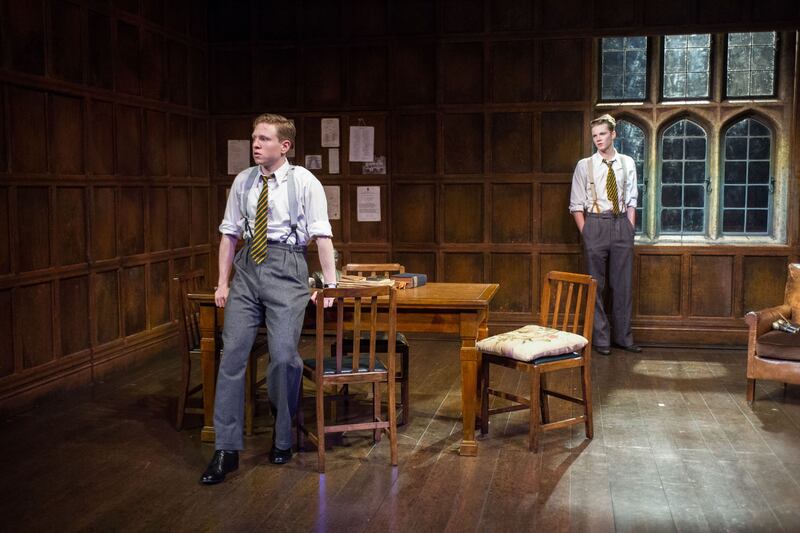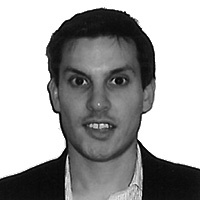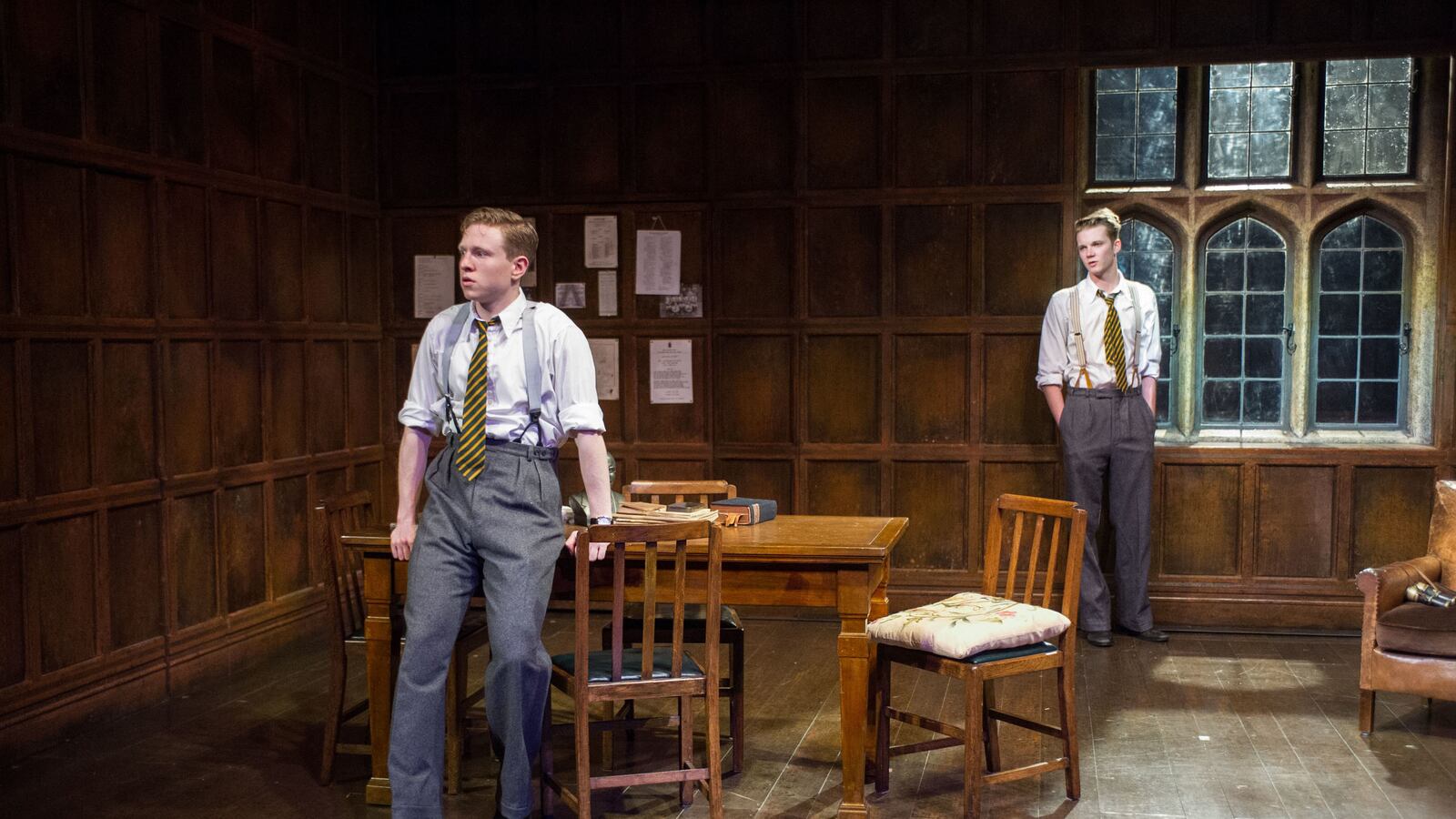If a modern British play is a critical and commercial hit in the West End, its chances of transferring to New York are a good deal stronger than cricket ever catching on Stateside. Richard Bean’s One Man, Two Guvnors and Mike Bartlett’s Cock are two recent illustrations that theater successfully staged over there will work over here. But there is a contemporary British classic which stands as a curious exception to this rule—Julian Mitchell’s Another Country.

The 1981 drama, set in a 1930s English public school, is presently enjoying a hugely successful London revival at the West End’s Trafalgar Studios. The play chronicles the conflict faced by two privileged outsiders, openly gay Guy Bennett and his roommate Communist Tommy Judd, when confronted with the lies and hypocrisy that prevail at their educational establishment.
Bennett is loosely based on British spy Guy Burgess and in this post-Snowden era in the UK where gay marriage is enshrined in law and class is as relevant than ever, owing to the elite background of Prime Minister David Cameron and his political circle, Another Country is resonating with audiences.
“To my surprise I’ve had fan letters from people who are at school now,” says Mitchell, 79, “and they say things haven’t changed; the attitude towards sports, the tremendous drive for schools to try and produce conventional people.” For all its comic humaneness, Another Country powerfully depicts how the consequences arising from the deceit incurred pursuing conformity and the suppression of sexuality at British public schools can linger on for a lifetime.
“What doesn’t make any difference is that when you discover you’re gay it’s a terrible shock,” Mitchell says. “You don’t know how you’re going to cope and what other people are going to think. That’s never going to change for people when they’re adolescents.”
In its first incarnation, Another Country helped launch the careers of a generation of British acting stars. Rupert Everett, Kenneth Branagh, Colin Firth and Daniel Day-Lewis all acted in the drama over the course of its 18-month West End run at the Queen’s Theatre. It’s as if Daniel Radcliffe, Robert Pattinson, Charlie Cox and Tom Hiddleston were to now all make their name acting in the same play. (UK critics have speculated the current version’s leads, Rob Callender and Will Attenborough— grandson of filmmaker Sir Richard Attenborough—will go far.) Another Country then became a hit film in 1984 with Everett reprising his role as Bennett and Firth as Judd.
Mitchell was inspired to write Another Country by the revelation in 1979 that the eminent art historian Anthony Blunt, surveyor of the Queen’s Pictures, was in fact a KGB spy, recruited by Soviet intelligence at Cambridge University, along with traitors Kim Philby, Guy Burgess, Donald Maclean and John Cairncross.
“I thought people had misunderstood the 1930s, the Cambridge spies and why individuals might want to turn against their society”, says Mitchell. “They said, ‘We understand what happened- it’s very easy to be a Communist when you’re young.’ But what you learn in my view at a public [private] school is not so much Latin, French or history. You discover what other human beings are like and what they’re likely to remain. I don’t think your view of human nature changes much after school.”
Even though Mitchell’s CV included writing six novels published in the 1960s and stage and screen work such as Half-Life featuring Sir John Gielgud at the National Theatre and Stanley Donen’s 1966 film Arabesque, which starred Sophia Loren and Gregory Peck, it was a battle to get Another Country staged: “It took me two or three months to write but it was turned down by everybody.” Mitchell himself invested in the production when it began life, directed by Stuart Burge, at the fringe Greenwich Theatre in south-east London in November 1981. He was improbably aided by an arts-loving bank manager. “The bank manager at my local Barclays was a sculptor, not a good one. He would put his sculptures in the bank and customers would hang their hats on them! But he was sympathetic to the arts and let me borrow money.”
Everett was discovered by Mitchell during auditions for Another Country. In his memoir Red Carpets and Other Banana Skins, Everett recalls, “From the very beginning the audience was swept away by the play [Another Country]. It was a curious feeling. We couldn’t believe it. They laughed at almost every line…we were a hit, the theatrical version of a boy band.”
Fascinatingly Everett’s subsequent colorful and difficult Hollywood career mirrors his character Bennett’s conflict over whether to embrace rebellion or conformity. “Rupert’s problem was he wasn’t really sure what it was he wanted to be, whether it was an actor or a star,” says Mitchell. “I think he really wanted to be a star and that misled him or took him down all sorts of false turnings. But now he’s come back to being an actor.”
Everett was joined in the production by Kenneth Branagh playing Judd who Mitchell based on the English poet John Cornford who died aged 21 fighting in the Spanish Civil War. With Communism now a spent ideological force, Mitchell says, “if I was writing it today, it would be someone who would be Green and passionately intolerant about the way we behave.” During the play’s West End run, Branagh— currently making his New York stage debut in Macbeth at the Park Avenue Armory— met fellow cast member David Parfitt and the pair were to form the Renaissance Theatre Company that served as the springboard for the Shakespeare-centered plays and films which solidified his success.
Daniel Day-Lewis followed Everett as Bennett. “Daniel was different to Rupert,” says Mitchell, “not gay, a bit older and darker.” Colin Firth, who had played Bennett, then played Judd in the 1984 film of Another Country directed by Marek Kanievska. “Rupert was horrible to Colin during the filming, very jealous at this other young person coming up,” says Mitchell. Unlike with Everett, Mitchell is still in regular contact with the Oscar-winning Firth: “I said to Colin the other day, ‘How are you getting on with Rupert?’ Colin said, ‘As far as I know I think we’re best friends!’”
This acclaimed study of how youthful lies engender spies made it no further in America than a short run at the Long Wharf Theatre in New Haven, CT, in 1983. Mitchell blames both Frank Rich, then New York Times theater critic, and the play’s English sensibilities. “It had good actors in it,” Mitchell says. “Peter Gallagher played Bennett. But the language about public schools and cricket bewildered audiences and Frank Rich gave it a stinking review. He killed it.” Broadway plans were shelved. “There was a lot of talk about it going to the Roundabout and there was a rich lady producer who dillied and dallied but decided not to do it.”
Perhaps if the film of Another Country, an arthouse hit in the US when it was released thirty years ago this month, had preceded the play, things might have been different. Mitchell maintains he prefers the stage version of Another Country: “The film is really a romance, but the play is a much more interesting work.” Mitchell’s next play Francis, a study of the life of St Francis of Assisi with Kenneth Branagh in the title role, bombed in London. “It was a complete disaster,” he says. “The critics thought I’d been converted to extreme Catholicism. One idiot reviewer said it was my gay take on St Francis.”
Mitchell has lived with his partner Richard Rowson, a philosopher, for 45 years. After Another Country, he wrote the films Wilde, a biopic of the Irish writer starring Stephen Fry and Jude Law, and Consenting Adults, a BBC drama about the personal and political life of Sir John Wolfenden whose Wolfenden Report paved the way for the decriminalization of homosexuality in Britain in 1957.
Mitchell takes umbrage at the notion of being defined by his sexuality. “I am gay and I am a writer but I don’t think of myself as a gay writer. I think of myself as a writer.” How important is identity to the creative existence? “It’s a question of the quality of your imagination. Whether you can get outside your own skin or sexuality and look at the world with a dispassionate eye. Propaganda theatre is never as interesting as proper theatre.”
Though Another Country was the most lucrative work either has ever embarked upon, Mitchell has never worked with Rupert Everett again. Indeed Everett—who played Wilde in a West End revival of David Hare’s The Judas Kiss last year and who is trying to get his own Oscar Wilde film off the ground—criticized Mitchell’s take on the writer. ”Julian’s vision of Wilde, I don’t agree with it,” he told the Cheltenham Literary Festival in 2012. “It was completely wrong because it was all about family values and he was so po-faced and serious.” Yet when I ask Mitchell about Stephen Fry in Wilde, Everett comes back into view: “Like Rupert, Stephen is more of a personality than an actor and that can get in the way. But I don’t think it did in Wilde. He worked very hard to get it right.”
Mitchell certainly got Another Country right. It’s directed by Jeremy Herrin whose production of Noises Off will come to Broadway next year and whose stage versions of Hilary Mantel’s historical novels, Wolf Hall and Bring Up the Bodies, are also surely New York-bound. But as things stand, there are no plans for a US transfer of Another Country. Come on, adventurous producers: it’s surely time, over thirty years late, for Another Country to be given its due in New York.





